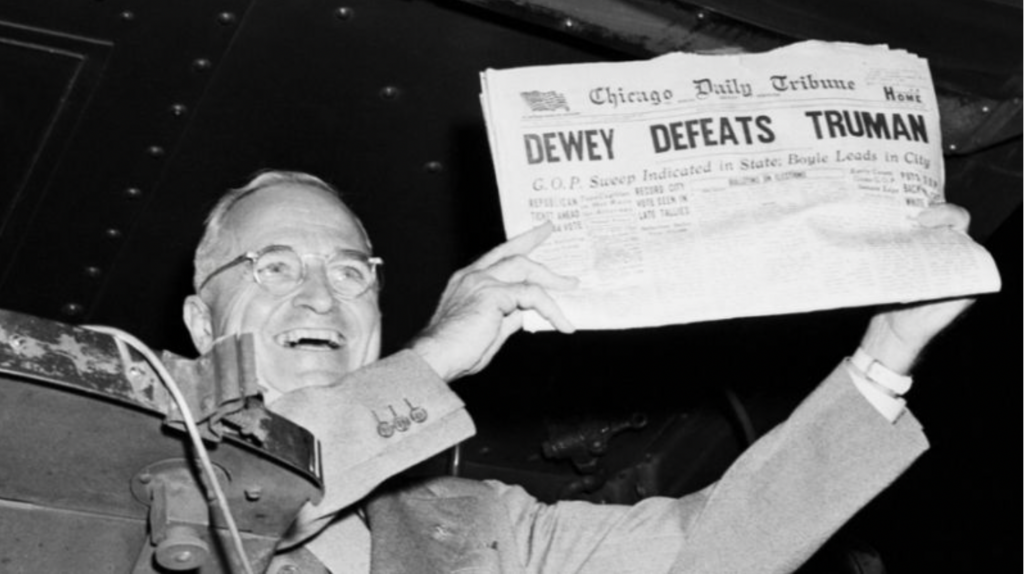Harry Truman holding the Chicago Tribune following reelection in 1948
Truman Doctrine (1947)
“At the present moment in world history, nearly every nation must choose between alternative ways of life. The choice is too often not a free one. One way of life is based upon the will of the majority and is distinguished by free institutions, free elections, freedom of speech and religion… The second way of life is based upon terror and oppression, a controlled press and radio, fixed elections and suppression of personal freedoms. I believe that it must be the policy of the United States to support free peoples who are resisting attempted subjugation by armed minorities or outside pressures. I believe that we must assist free peoples to work out their own destinies in their own way.” —Harry Truman, March 12, 1947
- Request to Congress for $400 million in military and economic aid to Greece and Turkey
- Congress approved in May 1947
Marshall Plan (1947-48)
Aside from the demoralizing effect on the world at large and the possibilities of disturbances arising as a result of the desperation of the people concerned, the consequences to the economy of the United States should be apparent to all. It is logical that the United States should do whatever it is able to do to assist in the return of normal economic health in the world, without which there can be no political stability and no assured peace. Our policy is directed not against any country or doctrine but against hunger, poverty, desperation and chaos. Its purpose should be the revival of a working economy in the world so as to permit the emergence of political and social conditions in which free institutions can exist. —George Marshall, June 5, 1947
- Begun as European Recovery Plan (ERP) but expanded with request to Congress in early 1948
- Sen. Robert Taft (R-OH) led opposition
- Eventually approved and US spent $13 billion from 1947-51
- Conditions included support for US industries, free trade and liberal / democratic institutions
- Soviets and their satellites declined to participate
Berlin Blockade (1948-49)
NATO (1949)
Article 5
The Parties agree that an armed attack against one or more of them in Europe or North America shall be considered an attack against them all and consequently they agree that, if such an armed attack occurs, each of them, in exercise of the right of individual or collective self-defence recognized by Article 51 of the Charter of the United Nations, will assist the Party or Parties so attacked by taking forthwith, individually and in concert with the other Parties, such action as it deems necessary, including the use of armed force, to restore and maintain the security of the North Atlantic area. —April 4, 1949
- Precursors to NATO: US-French Alliance (1778), United or Allied Nations (1941-45), Rio Treaty (1947) Brussels Treaty (1948)
- North Atlantic Treaty Organization: US + [UK, France, Belgium, Luxembourg, Netherlands] + Canada, Denmark, Iceland, Italy, Norway and Portugal
- NATO additions: Greece (1952), Turkey (1952), West Germany (1955)
- Warsaw Pact formed in 1955

